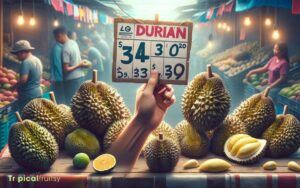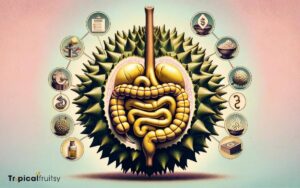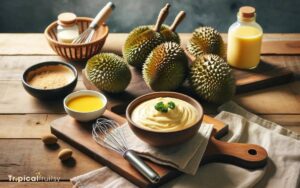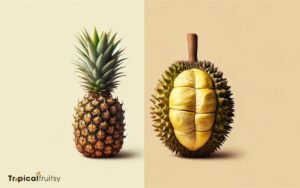Durian Cannot Eat with What Food? Durian Dining Guide!
Durian should not be consumed with alcohol, caffeine, high-protein foods, certain types of seafood, and some medications due to potential health risks and interactions.
It’s important to be aware of these dietary restrictions when enjoying durian to avoid adverse effects.
Durian is a unique and nutritious fruit but it contains compounds that can interfere with the body’s metabolism when consumed with certain substances:
Consuming durian responsibly involves avoiding combinations with alcohol, caffeine, and other contraindicated foods to ensure health safety.
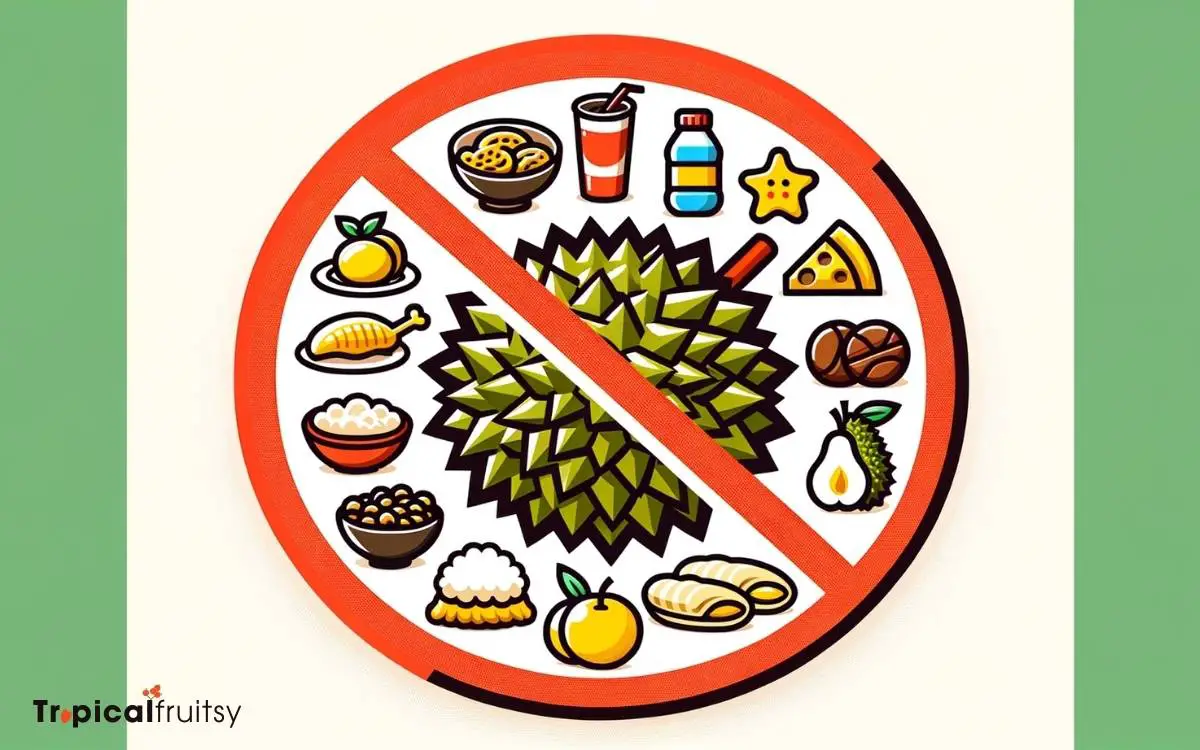
Key Takeaway
The heavy protein load from seafood may overwhelm the digestive system, and the amino acids in seafood could react with durian’s compounds.
Additionally, durian can interfere with the metabolism of medications, altering their effectiveness and potentially increasing concentrations and side effects in the bloodstream.
There is also a risk of hyperkalemia when combining durian with certain medications.
Foods and Substances to Avoid When Eating Durian
| Food/Drink/Substance | Reason to Avoid with Durian | Potential Effects |
|---|---|---|
| Alcohol | Inhibits alcohol breakdown | Toxicity, nausea, vomiting |
| Caffeine | Strain on circulatory system | Palpitations, increased blood pressure |
| High-Protein Foods | Sulfur content interference | Bloating, indigestion |
| Certain Seafoods | Potential allergic reaction | Discomfort, allergic symptoms |
| Some Medications | Alters drug metabolism | Reduced effectiveness, side effects |
Alcohol: A Risky Combination
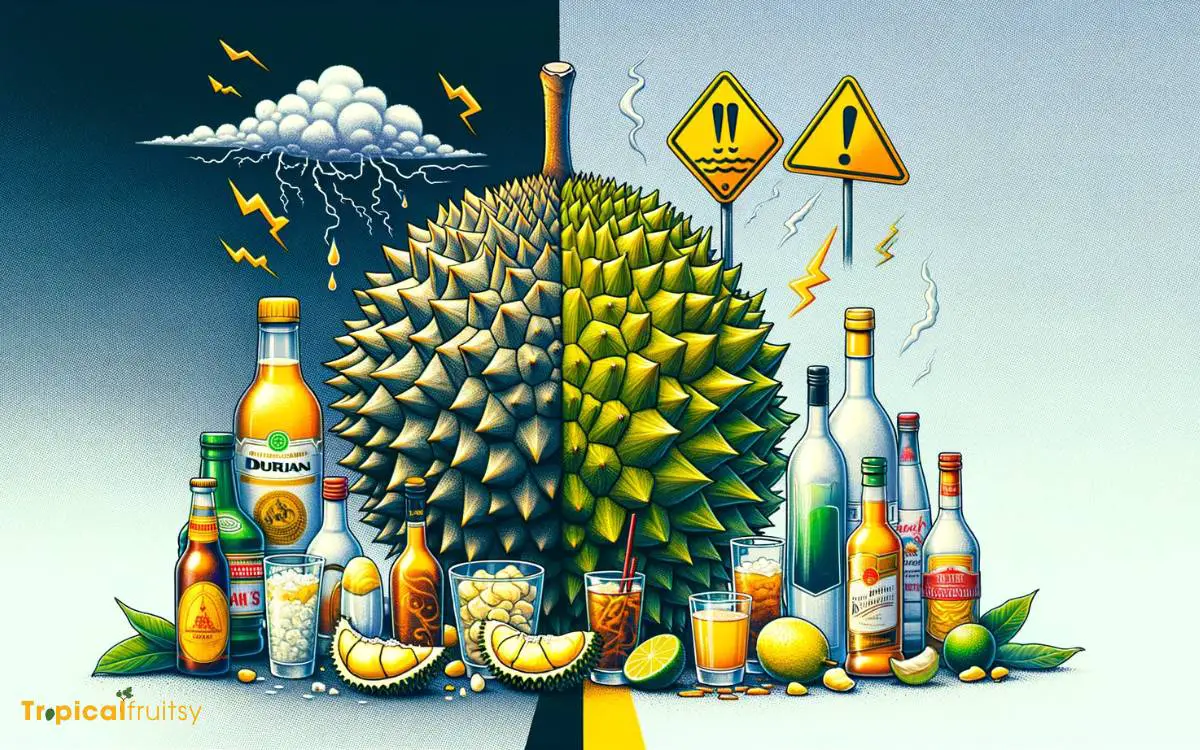
Durian’s consumption alongside alcohol is widely cautioned against due to potential health risks.
Scientific scrutiny reveals that durian fruit contains compounds that may inhibit aldehyde dehydrogenase (ALDH), an enzyme pivotal in the metabolism of alcohol.
Consequently, the concurrent intake of durian and alcohol could lead to an accumulation of acetaldehyde, a toxic metabolic byproduct, exacerbating the effects of a hangover and potentially leading to more severe reactions like nausea, vomiting, or palpitations.
The precise biochemical interaction remains a subject of ongoing research; nevertheless, the available evidence suggests a plausible adverse effect when these substances are consumed together.
Health professionals advocate for caution, recommending that individuals avoid this combination to mitigate potential adverse health outcomes. It is prudent to adhere to this guidance until further conclusive studies are available.
Caffeinated Beverages: Proceed With Caution
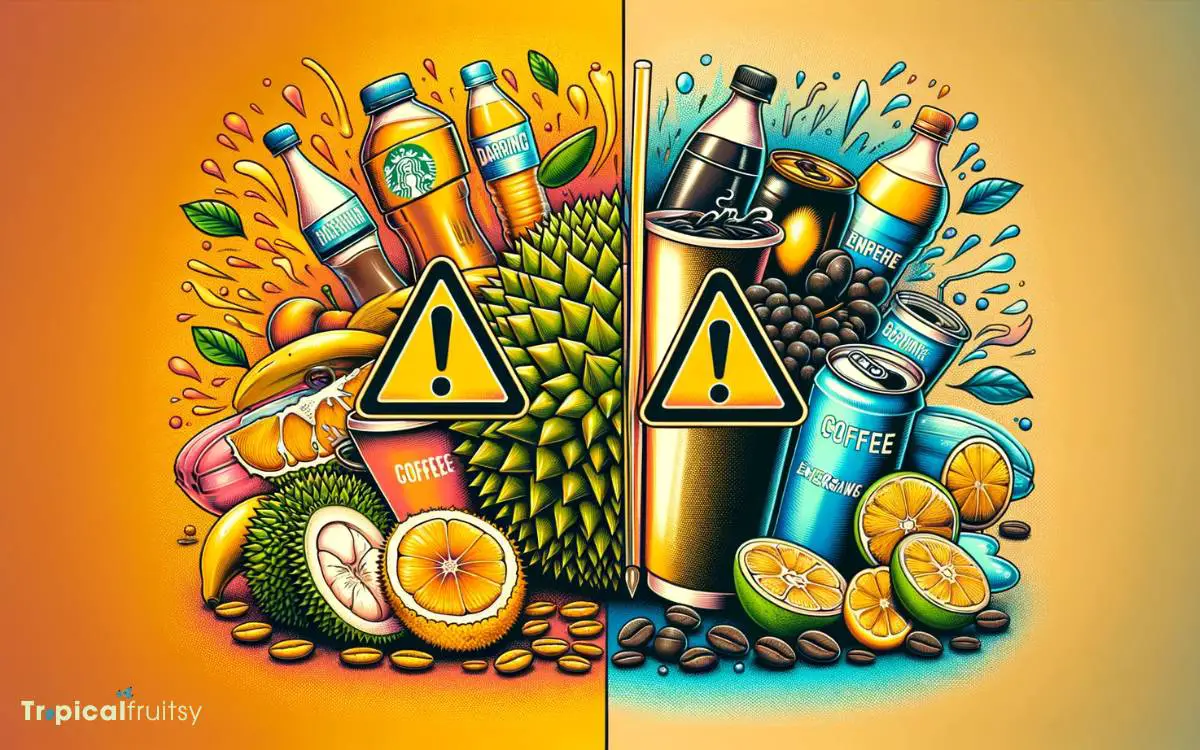
Similarly, individuals frequently report adverse reactions when consuming durian in conjunction with caffeinated beverages, necessitating caution with such pairings.
The physiological interaction is not yet fully understood, but it is hypothesized that caffeine may exacerbate the effects of certain compounds in durian.
Caffeine is a stimulant, and its concurrent intake with durian’s high sulfur content could potentially elevate blood pressure or lead to palpitations.
Empirical data is scarce, but anecdotal evidence suggests a synergistic effect that may increase the risk of discomfort or more severe symptoms.
Until more research clarifies this relationship, it is prudent to moderate the consumption of caffeinated drinks when enjoying durian.
As we consider other dietary combinations with durian, attention must also be given to high-protein foods: potential hazards may arise from such mixtures.
High-Protein Foods: Potential Hazards
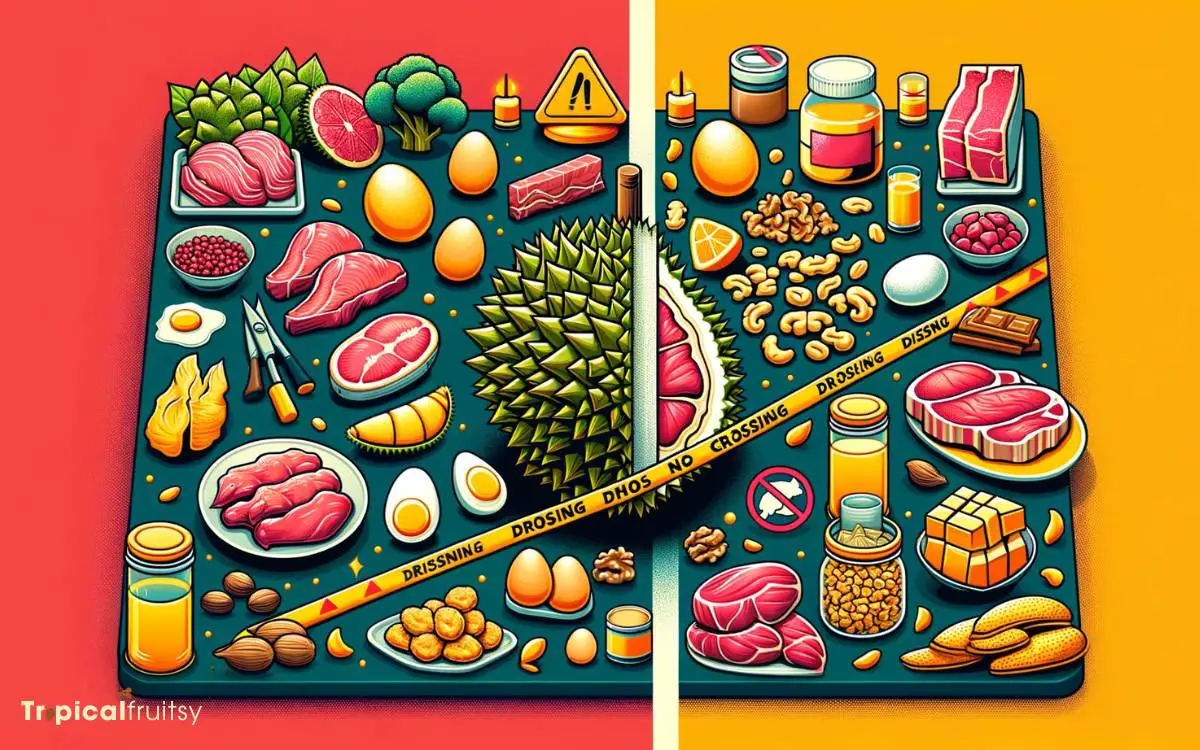
Consuming durian alongside high-protein foods may pose risks due to the fruit’s complex biochemical makeup. Durians are rich in sulfur compounds, which can affect the metabolism when ingested with protein-dense foods.
High-protein items, particularly those containing certain amino acids, might lead to an increase in the body’s metabolic rate, potentially causing digestive issues when combined with durian.
Scientific inquiry suggests that this combination may lead to discomfort due to the increased workload on the digestive system.
Analysis of dietary interactions is crucial, as the body’s response to such nutrient-dense combinations is not uniform across all individuals.
As we understand these interactions, caution is advised when pairing durian with protein-heavy meats and legumes.
This awareness is equally pertinent when considering certain seafood, which may present a dangerous mix with durian.
Certain Seafood: A Dangerous Mix

The combination of durian with certain types of seafood has been flagged as potentially hazardous due to adverse biochemical reactions. When consumed together, these food items may result in discomfort or more serious health issues.
Here are the primary concerns:
- Sulfur Compounds: Durian contains high levels of sulfur which can interfere with the body’s ability to metabolize certain elements in seafood, potentially leading to toxicity.
- Digestive Stress: The heavy protein load from seafood combined with durian’s complex sugars may overwhelm the digestive system.
- Amino Acids: Certain amino acids in seafood could react with durian’s compounds, producing unwanted effects.
- Alcohol-Like Syndrome: There’s a risk of symptoms akin to alcohol consumption when these foods are combined, due to their fermentation properties.
Consumers should approach this combination with caution, prioritizing their health and well-being.
Medications: Interactions to Avoid
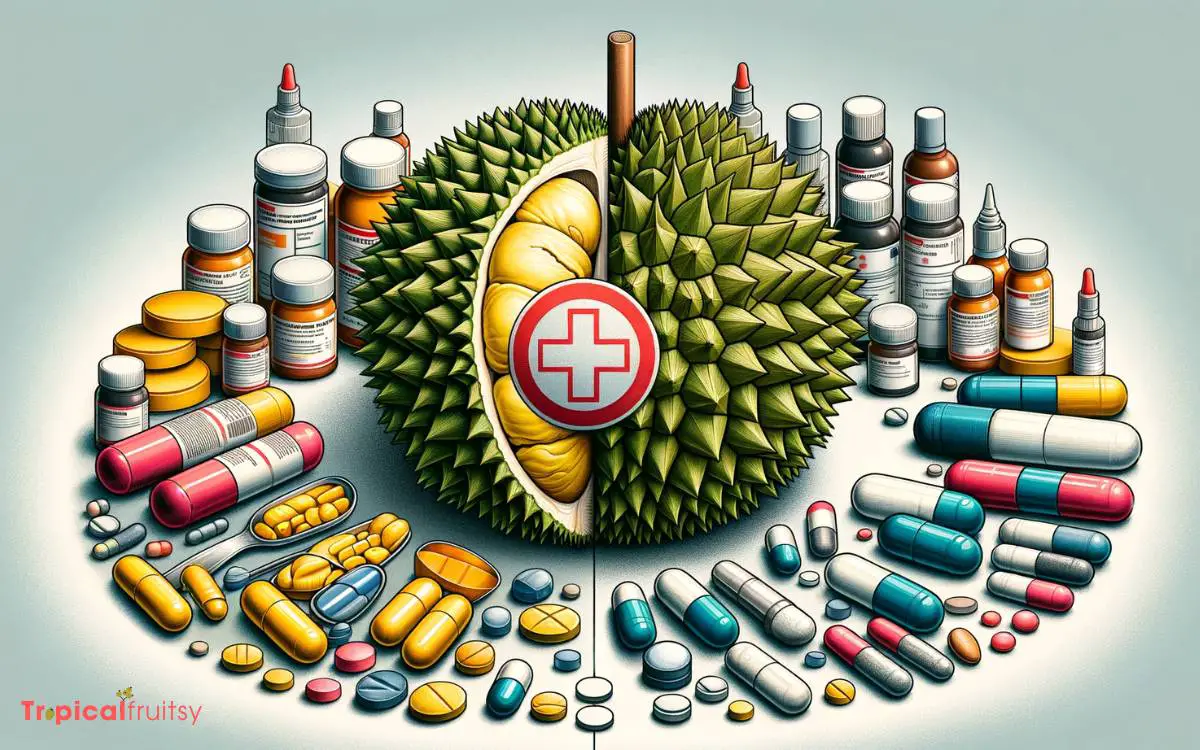
Several medications are known to interact adversely with durian, necessitating caution among those under pharmaceutical care.
Specifically, durian contains compounds that may inhibit the activity of certain enzymes responsible for metabolizing various drugs.
This inhibition can lead to increased concentrations of medications in the bloodstream, potentially causing toxicity or enhanced side effects.
For instance, durian could interact with drugs metabolized by cytochrome P450 enzymes, such as antidepressants, antihistamines, and some cholesterol-lowering statins.
Additionally, due to its high potassium content, durian may pose risks when consumed with angiotensin receptor blockers or ACE inhibitors, medications commonly prescribed for hypertension, as they also increase potassium levels, elevating the risk of hyperkalemia.
Patients should consult healthcare providers about potential food-drug interactions to manage their medication regimes safely.
Conclusion
In summary, the amalgamation of durian with alcohol, caffeinated beverages, high-protein foods, certain seafood, and medications forms a mélange fraught with potential peril.
As a fruit whose ingestion can influence metabolic processes, durian demands cautious consumption, particularly when combined with substances that may provoke adverse reactions.
Consumers are thus advised to heed dietary guidelines and consult healthcare professionals to navigate this gastronomic minefield, ensuring the enjoyment of durian remains untainted by unintended consequences.


